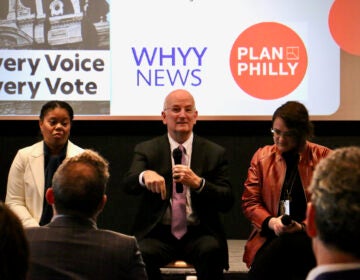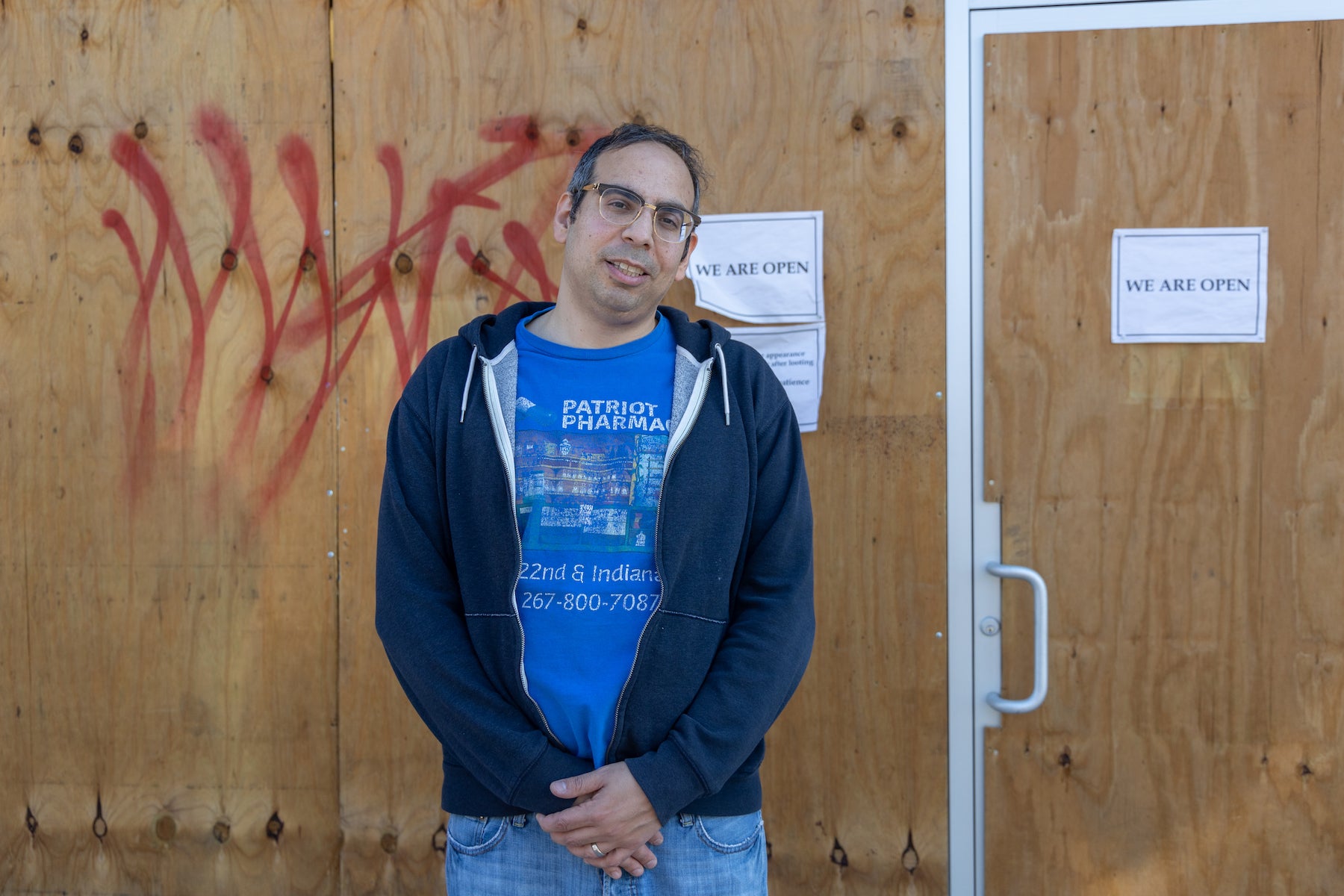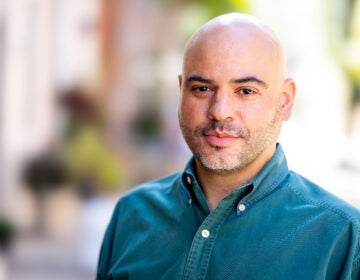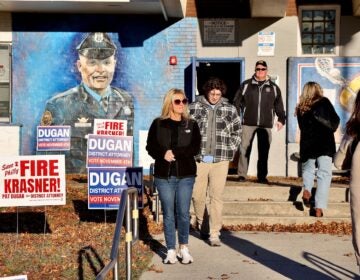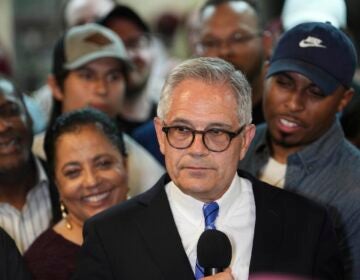What do Philly’s small business owners want from the city’s 100th mayor? ‘Fix everything’
As they prepare to cast their ballots in the general election, some small business owners say they’re frustrated over a lack of city support.
Listen 2:17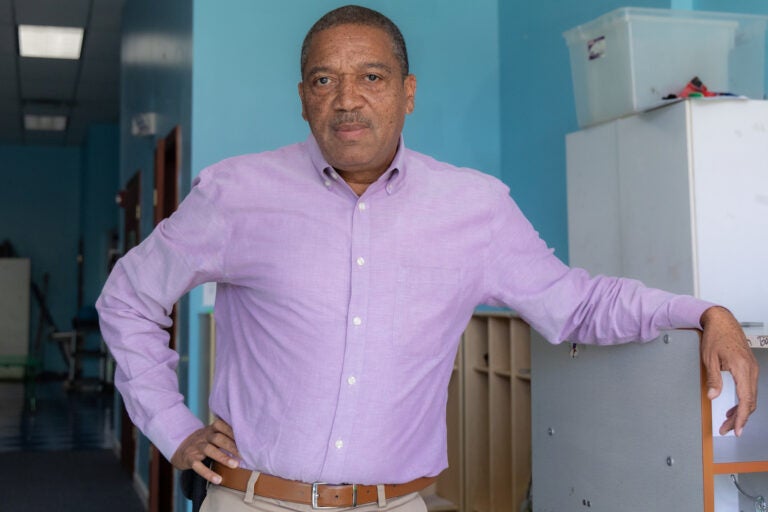
Ken Curry is the President of the Allegheny West Foundation. (Kimberly Paynter/WHYY)
Philadelphia is a city of neighborhoods. Instead of staying broad, this news series goes deep on three topics with small business owners who are the eyes on the street each day on one block: public safety, city services, and workforce development.
This story is a part of the Every Voice, Every Vote series.
What questions do you have about the 2023 elections? What major issues do you want candidates to address? Let us know.
About eight years ago, Ken Curry was entrusted as the next president of the North 22nd Street Business Association in North Philadelphia. The neighborhood-level commercial corridor contains retail storefronts on the first floor and apartments above between Lehigh and Allegheny avenues.
Curry is old enough to remember that about 50 years ago, before Connie Mack stadium was demolished in the 1970s, the Philadelphia Phillies played in North Philly.
“So people before and after games would visit this business strip and shop,” said Curry, who wore a freshly starched collared dress shirt during an interview at a commercial property built in 1957 — a home to the business association — courtesy of the Allegheny West Foundation Community Development Corporation.
But where that sports stadium once stood has been a megachurch for decades — the Deliverance Evangelistic Church was built in 1992 — with simply a historical plaque in front noting what was once called Shibe Park.
Curry still attends Phillies games, but now in South Philadelphia at Citizens Bank Park.
When the main reason for the decades of retail foot traffic disappeared, businesses along the strip began to rely on fewer citywide customers and more in the immediate neighborhood. As such, the success of the corridor has waxed and waned over the years. Most recently, several businesses were vandalized and robbed — store windows smashed, goods stolen. Many were Black- and brown-owned companies with deep roots in the community.
These small businesses and their successes or struggles are a microcosm for the city. These countless entrepreneurs are also the foundation of the city of Philadelphia’s tax base. As stakeholders in the positive or negative outcomes stemming from decisions made inside City Hall, WHYY News interviewed small business owners about their vision and ideas to improve city services.
A path forward
Curry said that he’d love for the next leaders of Philadelphia to implement an overarching plan, then execute it with precision and equity.
“We don’t get basic city services in some situations,” he said. “We need a comprehensive master plan that we’re going to deal with these things and get back to where we should be.”
Curry points to the trash and illegal dumping situation as an example. “[It’s] a huge problem in our city,” he said.
“Reinforcing not only fines for illegal dumping but upping the ante on penalties for that,” he said. “People think, oh it’s not a big deal if I get caught I’ll just pay the fine. I want something in place where if you [dump trash] you’re going to pay dearly for that. That’s how we’re going to stop these things.”
As entrepreneurs, Curry and his wife, Yvonne Thomas-Curry, own and operate several early learning education centers across the city.
The small chain, Precious Babies Learning Academies, includes their second location on 22nd Street.
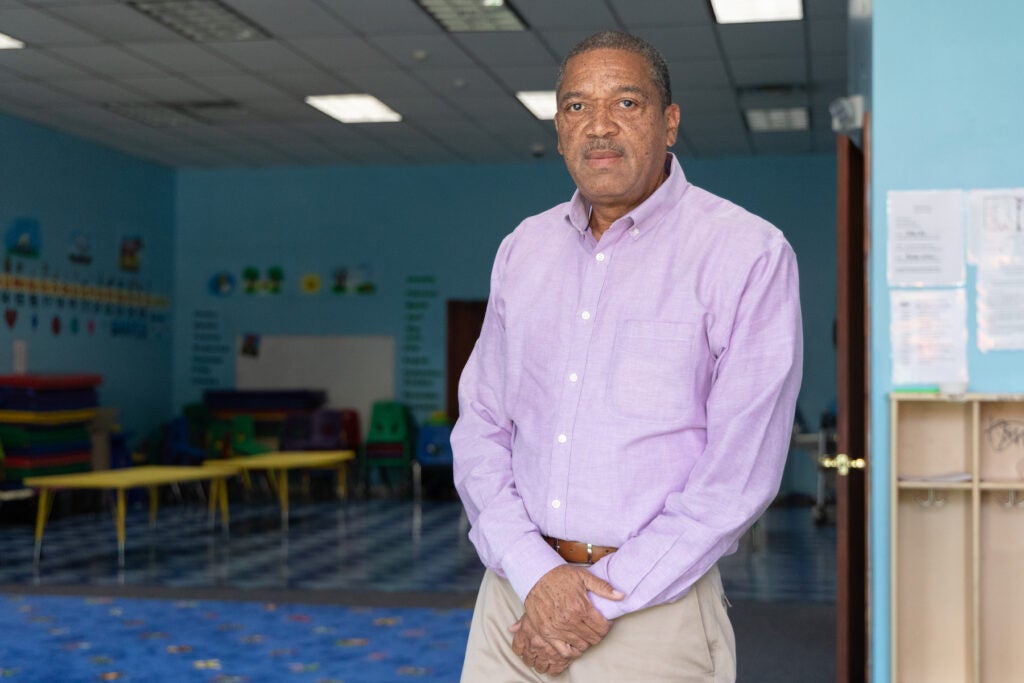
Curry, who has a face full of freckles and wears his salt and pepper hair in a close cropped cut, did not anticipate that he would help build a cluster of childcare centers as a teenager who was born and raised in North Philly. As a mechanical engineer by training with a college education, he had a different plan.
Then life happened. He found himself working for a cleaner and laundromat as a young man in school. He started investing in local real estate, which included a modest five-unit apartment complex with a doctor’s office and a cleaner’s shop.
“The couple that owned the cleaners and the building that I bought, were an old couple,” he said “I just figured when they retire, I was gonna renovate that and start my own cleaning business. But it just so happened that the doctor’s office that was in the building I owned closed. And my wife wanted to make it a day care. I grew up in this neighborhood, I knew what the needs were and there were no child care centers.”
It turns out there was pent-up demand for child care services. His wife Yvonne had expertise in education and a sense for business.
“The day care just exploded,” he said. “By the time the cleaners did retire, the day care had a waiting list.”
It’s unclear how many younger entrepreneurs in the North Philly community along 22nd street can achieve that sort of success decades later.
Wages for the average worker have stagnated, homeownership affordability is at record lows, the gap between the wealthiest and the poorest has grown exponentially, and for many, the concept of purchasing commercial real estate in their community feels completely out of touch with reality.
Foundation of expertise
It’s not for a lack of trying.
Dozens of small businesses on the corridor are family-owned, with several passed down generation by generation, even as the world of commerce changes rapidly around them.
A homegrown electronics shop sits several doors down from a corporate smartphone seller. Dollar store chains, discount grocery retailers, corporate pharmacies, and check-cashing spots compete with specialty shops nearby.
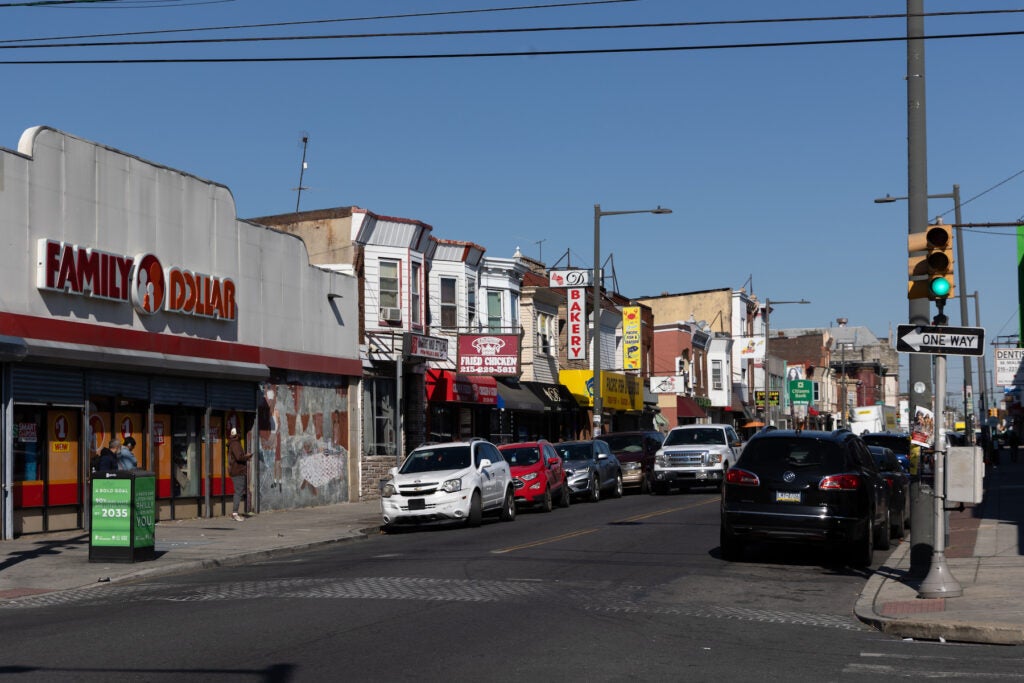
Some business owners bemoan the lack of city services, from trash collection to adult recreation activities. Others complain about the dearth of expertise and access to capital for new businesses for people with lower credit scores and an aversion to debt.
Public safety concerns are a throughline for business owners on the corridor. Though a lack of trust remains between residents and law enforcement, the broader community is tight knit and friendly. Still, there’s a general sense of unease about when the next chaotic situation may occur.
So far, the city’s response in the business strip has been to have officers patrol the blocks during the day. But there are fewer officers available than ever to do that work. To reduce the likelihood of crime, the city offers security cameras through a program, which requires a direct connection to the police, and a subsidy to repair broken retail store facades.
But a security camera can’t stop a bolt cutter from snapping a metal gate or a chunk of concrete smashing a window. And some argue that sharing security footage with police simply makes the retailer even more of a target.
Some argue that Philly’s tax structure is regressive because it siphons away money from a business — big or small — before profits are calculated. Instead, it relies on tax bills stemming from gross receipts or total sales value. There is a recent carve out for businesses with gross sales under $100,000 each year, but for decades that wasn’t the case, business owners said.
Beyond that, the city relies heavily on its wage tax for both residents and non-residents to keep what’s left of city services in operation, particularly after an exodus of workers since the COVID-19 pandemic began. Meanwhile, the burden of pension pay and pressure by unions to keep cost-of-living raises steady puts a strain on the entire system.
The neighborhood economy
On the North Philly corridor, it wasn’t solely an economic downturn over the past three years.
“We did lose some businesses,” through the pandemic, Curry said. “But a lot of businesses grew.”
Leonard Pell and his brother, Richard, were swamped at the meat market that’s been in their family for generations. During the pandemic, customers rushed to purchase deep freezers and buy meat in bulk, flush with extra government benefits.
Leonard, who has law enforcement in his family, said he wants to see “crime under control” and that current officers should be “taken care of and shown respect.”
“We need to get behind the police so they can get behind the citizens,” he said. “All the good businesses are getting run out. People just don’t think. How many times can you rebuild your business? It’s crazy. And it’s really sad.”
Leonard has advocated for more work programs tied to community trash pick-up. He’d love to see more diversity in the types of businesses, not just nail salons and barber shops.
“There used to be furniture stores,” he said. “We have all these steel gates. Nobody’s open.”
LaKeisha King Smith, who took over her father’s optometry practice alongside her brother, saw a flood of customers during the COVID-19 pandemic, many of whom were not local to the region and were stuck without a regular eye doctor during an economic shutdown.
“We follow the trend of gas prices going up and down. It really has a large effect on what people are buying,” she said.
For the first time in decades, the shop had a smash-and-grab situation where thieves helped themselves to the store’s designer glasses. Other than that, the store is well respected by the larger community and protected by the watchful eye of neighbors, she said.
Smith says she wants to see people get back to “being human” to each other.
“This is a community. We don’t function independently. We thrive off one another and we have to get back to that,” she said. “Even the police and civilian connection would just be different. Let’s treat each other as equals.”
When dealing with the city over taxes, it’s always a struggle, she said.
“It’s hard to get through to them. It’s hard to get clarity,” she said. “I don’t even know how to tackle it sometimes. It’s like I just throw up my hands in the air and go back to it in a month because it’s so frustrating.”
The taxes are too high, whether as a business owner, resident of Philly, or commuter, she said.
“This just doesn’t give people the opportunity to move up or just get ahead,” she said. “That’s definitely something that they need to work on, especially with businesses. Focus on small businesses, community police efforts, and how the police are policing. They will see a big difference and people will be happier. It’ll be more peaceful.”
She wants the city to support small businesses, not just offer tax breaks to the biggest companies.
Lack of neighborhood wealth
For those without generational wealth to rely upon, it’s more of an uphill battle.
Fred Cerrome Hill, who grew up in Germantown and is a barber by trade, achieved his goal of renovating and purchasing a vacant retail property along the business corridor during the pandemic. It’s now customized as a black and white-themed barber shop hub with stainless steel pick-up truck boxes for shelves and storage — a project he took up in July 2020.
“I realized that it didn’t make good business sense [to rent three different retail shops for 20 years]. If I wanted to be successful in my business I realized that I had to purchase,” he said.
But it took him nearly 30 years of long days and countless hours to own the store, about 15 years of which was spent leasing space on the block before he was ready for that move.
Hill said that once he picked up a pair of barber’s clippers at 21 years old, he never put them down. But the journey to that career was not linear, he explained. As a young adult, he says he hung out with the “wrong crowd.”
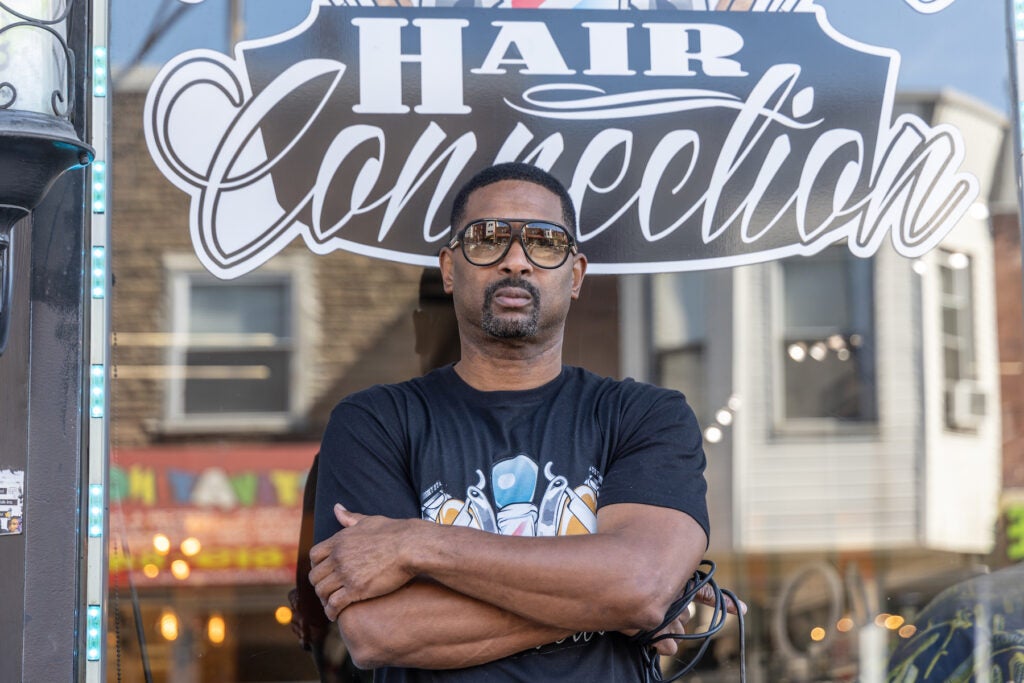
He said he’d love to see more police protection of businesses, such as offering overtime to security guards who are willing to stand on the corners and “let people know that you can’t tear up a community.”
In general, he wants to see quality police protection across the city.
“We would like to have the same protection that they have, like in South Philly,” he said. “Their community doesn’t get tore up. Evidently they’re getting the job done. They don’t have to start over from ground zero, to try and get back up established after something happened.”
Beyond police, Hill would like to see more public trash cans and a reduction in taxes. He’s disappointed in the high cost of a flat commercial trash fee despite the type of trash removal — about $300 a year.
“For the first 20 years of me being in business I really didn’t make [any] money,” he said. “I had to stay 10 toes down and just wait and see how it was going to play itself out. With me being a barber, it made it feasible to stay in it.”
Ben Nachum, a Philadelphia native, opened an independent pharmacy in 2019 that has seen an influx of customers since the pandemic and even provided COVID-19 vaccines. But the shop struggles with low reimbursement rates by insurance giants for medications. The pharmacy has repeatedly lost product and had to repair the shop from three robberies and acts of vandalism since it opened, and he’s still leasing a space with tens of thousands of dollars of repairs and repeated investment.
“If I’m not paid appropriately by the insurances then I can’t continue here as I attempt to recover from the looting … then I can bring in extra help to make it easier on everyone,” he said. “Do I like having to operate behind plywood? No. But we’ll repair everything.”
Nachum says he would love to see the city get involved in encouraging a more level playing field for health care organizations.
“I’d like to see a mayor get involved in changing how our city’s Medicaid operates and how they take care of pharmacies,” he said. “[Independence Blue Cross Blue Shield] representatives won’t speak to the local pharmacy organizations. They pay poorly, and so it’s hard for us to stay open. We’re getting paid poorly by the Medicaid insurances whose population we serve. I rely on what I make from insurance to support myself, my employees, and to serve the community.”
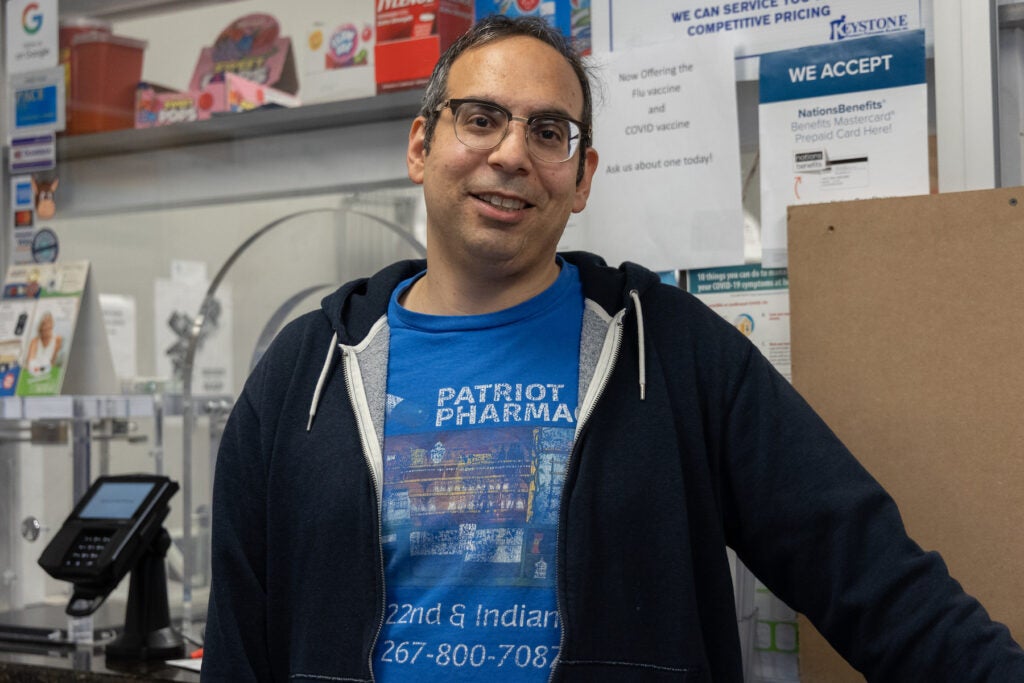
To improve public safety, Nachum has advocated for more police protection.
“We had a police officer who would always be on the block. He passed away,” he said. “Ever since then, we have an officer who walks the block but I don’t see her everyday like I did the other officer.”
He also wants to see more employees hired to run public agencies.
“I think that if the staffing is better in public agencies then in turn it will help people find resources faster,” he said. “That’s upsetting that we’re the biggest poorest city. I grew up as a poor person in the city of Philadelphia. I didn’t realize I was poor until I went to high school. I think it’s all about how you allocate our [tax] funding.”
Dreams on the corridor
Recent entrepreneur Tameka Montgomery dreams of purchasing and renovating a vacant storefront nextdoor to the place where she leases retail space for her candle and essential oil products shop. To hedge her bets, she hosts candle-making classes at the store and still works as a reserve member of the U.S. military for a steady paycheck.
“I needed something to fall back on. You need multiple avenues of income nowadays,” Montgomery said. “If nobody walks through these doors, I’ve still got bills to pay. You hear a lot of talk about help out there and resources, but it’s not easily accessible.”
Montgomery said she’d love to see tangible accessible resources for small businesses, not just a link to a website about loan programs.
“Just like a small little office that you could go to on 22nd Street, where you could call and somebody actually answers the phone and you would get some results,” she said. “I don’t have capital. My vision is that I want the store to be fully stocked, operating six days a week.”
She’s not sure what the best path forward might be. She doesn’t participate in the city’s business camera program and has a hard time trusting police based on her own experiences.
“I was fortunate that nobody came and did anything to my business when they decided to start looting,” she said. “But what if one of these days I’m not so fortunate, everything that I’ve done with my business so far has been out of my own pocket. I think they would know better. I don’t even look like this [is] the kind of place to play with me like that. I’m particularly not a fan of tearing up where I live at. It’s stupid.”
Montgomery said she strives for her shop to be a positive place for the community, with specialty products residents can’t find in big-box retailers or discount stores.
“My store is like a good vibe,” she said. “The most that I’ve experienced is somebody outside sleeping in front of my door. I let him for a little bit because I just didn’t know his situation and I don’t want to be rude. But I kept checking the time and it was getting into business hours too much. So I did tell him that he had to wake up and initially when he woke up he was not so nice, but then he came back and apologized.”
Montgomery would love to see a diversity of businesses and potential limits on corner stores.
“Different people are coming in and buying up property and they’re making it look different. But the people who live in the community are still here and [the city] is letting stuff like more delis pop up. They are letting them sell liquor and stuff like that. It’s keeping people down,” she said. “When they get their first-of-the-month check. They’re going to the corner store, they’ll go buy beer all day. That’s not helping the community. You want to try and make it look good but on the back end y’all putting stuff in the community to hurt us.”
Nasir Yard, owner of Phresh Prints Ink, took a lackluster fashion line business concept nearly a decade ago and grew his own screen printing enterprise, but he still leases the retail building.
“I’ve been paying rent for eight years,” he said. “That’s a hefty tab.”
Yard said he’d love to see a tax break for small businesses or perhaps partnerships between small businesses and universities, for a slice of athletic wear pie.
“I feel like we overpay at times. We definitely need help from politicians because we’re the ones that are keeping the communities thriving,” he said. “We’re employing younger people from the community. We’re trying our best to compete with these bigger brands.”
Yard said he is tired of so much trash on the street and wants to see more options.
“I feel like we need more trash cans in these neighborhoods. When you go into the nice neighborhoods, there’s trash cans on every corner. I don’t get it,” he said. “It’s like the place where there is more trash doesn’t have trash cans, but where there’s not a lot of trash there’s one on every corner.”
For newer entrepreneurs, their experiences with the city often include basic support services and a heavy-handed penalty system, Curry, the business association president said.
“People are motivated to open [a business] but [often] they have no business background, so they learn by trial and error. I meet these people constantly. They really need help, they need some education,” he said. “When you do something wrong there’s a whole lot of people who tell you, ‘Hey, that’s wrong.’ But there’s no one up front to [say], ‘Hey, this is how you want to get it done.’”
 This story is a part of Every Voice, Every Vote, a collaborative project managed by The Lenfest Institute for Journalism. Lead support is provided by the William Penn Foundation with additional funding from The Lenfest Institute, Peter and Judy Leone, the John S. and James L. Knight Foundation, Harriet and Larry Weiss, and the Wyncote Foundation, among others. Learn more about the project and view a full list of supporters here.
This story is a part of Every Voice, Every Vote, a collaborative project managed by The Lenfest Institute for Journalism. Lead support is provided by the William Penn Foundation with additional funding from The Lenfest Institute, Peter and Judy Leone, the John S. and James L. Knight Foundation, Harriet and Larry Weiss, and the Wyncote Foundation, among others. Learn more about the project and view a full list of supporters here.

Get daily updates from WHYY News!
WHYY is your source for fact-based, in-depth journalism and information. As a nonprofit organization, we rely on financial support from readers like you. Please give today.


